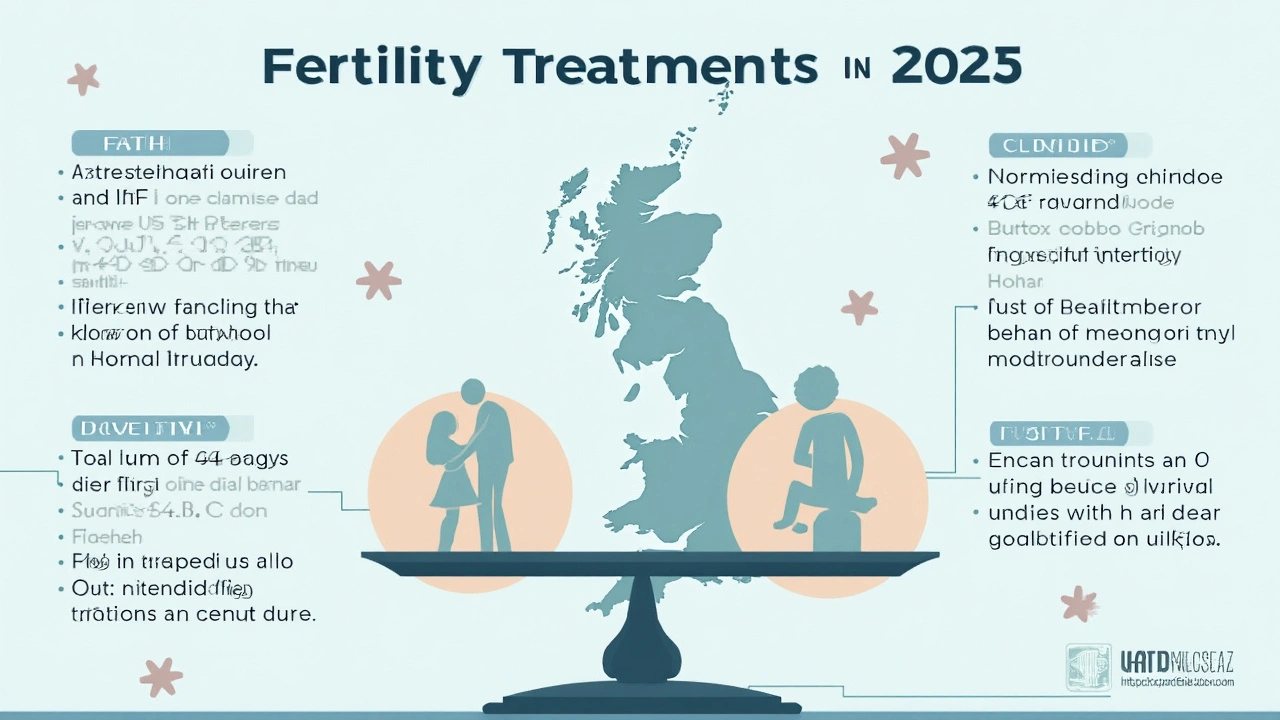
Hey there! If you’ve been exploring fertility treatments, you might've heard about Clomid as a go-to option for stimulating ovulation. But here we are in 2025, and there are plenty of alternatives on the market worth considering. It’s not just about finding what works but also understanding the ins and outs of each option available. So let’s dive in and see what could work for you.
In Vitro Fertilization (IVF)
First up, we have In Vitro Fertilization, or IVF for short. Essentially, this process involves retrieving eggs from your body, fertilizing them with sperm in a lab, and then transferring the embryo back to your uterus. As science progresses, IVF keeps proving itself as a powerful option for those facing infertility challenges.
Pros
- High success rates, especially for complex infertility cases.
- Options for genetic testing are available.
Cons
- It's quite costly and can be financially draining for many.
- The physical demands and the invasiveness of the procedure might be a downside.
Tackling fertility issues can be emotionally and physically demanding, but being equipped with the right info about alternatives can make a world of difference. Whatever path you choose, make sure it aligns with your needs and circumstances. Next, we'll explore more options you might consider alongside or instead of IVF.
- In Vitro Fertilization (IVF)
- Alternative 2
- Alternative 3
- Alternative 4
- Alternative 5
- Alternative 6
- Alternative 7
- Alternative 8
- Alternative 9
- Conclusion
In Vitro Fertilization (IVF)
If fertility is giving you the run-around, In Vitro Fertilization (IVF) might just be your best bet in 2025. This sophisticated process is where eggs are retrieved from the ovaries and fertilized outside the body. If all goes well, the embryo is then transferred back into the uterus. It sounds pretty high-tech, and for good reason—it's one of the most effective and advanced techniques available today.
What really makes IVF stand out is its high success rates, especially if you’re dealing with complex infertility issues. Unlike many other treatments, IVF offers options for genetic testing. This can be a real game changer if you're concerned about passing on hereditary conditions.
The Process
- First things first, you’ll start with hormone therapy to stimulate the ovaries.
- The eggs are then retrieved in a minor surgical procedure.
- Sperm is collected and then fertilized with the eggs in a lab setting.
- The resulting embryos are monitored for a few days to see which are healthy and viable.
- Finally, the best embryo is transferred back into the uterus in the hopes it will implant and grow.
Pros
- High success rates make it a popular choice for couples with complex fertility issues.
- Genetic screening options help ensure a healthy start.
- IVF success has steadily improved thanks to advances in reproductive technology.
Cons
- Cost can be a real hurdle—it's one of the priciest options out there.
- The physical demands are not to be underestimated; it can be emotionally and physically taxing.
- The procedure involves invasive steps like egg retrieval, which might not be everyone's cup of tea.
According to recent stats, the average cost of a single IVF cycle in the U.S. can range from $12,000 to $15,000. It's important to weigh these factors carefully when deciding whether to go down the IVF route. The journey is definitely not a walk in the park, but the potential reward of starting or expanding your family can be worth it.
Ovarian Drilling
So, you've heard of everything under the sun to address fertility, but here comes something that might sound a bit medieval but is actually a viable option today—ovarian drilling. It’s a procedure where a fertility specialist uses a tiny needle to puncture and burn parts of the ovary that are overtly producing excess male hormones. Wild, right?
This procedure is typically an option for women dealing with polycystic ovary syndrome (PCOS) who haven't had success with conventional treatments like Clomid or if other options don’t suit. In a way, it helps stimulate ovulation in a more direct manner.
Pros
- It can lead to natural ovulation without needing fertility drugs.
- If successful, it can sustain fertility over several months.
Cons
- There's a certain level of invasiveness as it is a surgical procedure.
- Potential for scarring which could impact fertility negatively, although it’s rare.
- Not a permanent fix and might need combination with other treatments.
You might be thinking: Is ovarian drilling effective? Studies have shown that about 50% of women regain ovulation, leading to natural conception for around half of them. It's not something everyone jumps at trying, but it has carved out a niche for those who have specific symptoms and challenges, like PCOS, where more traditional medications haven’t worked out.
If you're considering ovarian drilling, sit down with your fertility specialist and have an open chat about it. There's no one-size-fits-all in fertility treatments, so understanding how it fits into your personal journey is key.
Alternative 3: Injectable Gonadotropins
Injectable Gonadotropins are another Clomid alternative that have been finding favor for those with more complex fertility needs. These are hormonal injections that stimulate the ovaries directly and promote the development of multiple follicles, increasing the chances of conception.
This method is often used for women who haven’t responded well to Clomid or other oral medications. It requires close monitoring by a fertility specialist, as the treatment involves several customized injections depending on hormonal levels and your response to the medication. Let's break it down further.
Pros
- Allows for a more controlled stimulation of the ovaries compared to oral treatments.
- Can be more effective for women with specific types of ovulation disorders.
- Increases the chances of conception due to multiple follicles.
Cons
- Requires frequent doctor visits for monitoring, which can be time-consuming.
- Higher risk of multiple pregnancies due to stimulation of multiple follicles.
- May cause side effects like mood swings or bloating.
For a clearer perspective, here's a comparison of the success rates:
| Treatment | Success Rate |
|---|---|
| Clomid | 10-15% per cycle |
| Injectable Gonadotropins | 18-20% per cycle |
While injectable gonadotropins show promise with higher success rates, it’s important to weigh these benefits against the commitment and potential risks involved. Always discuss with your healthcare provider to tailor the best plan suited to your needs.
Alternative 4: Fertility Acupuncture
Okay, I know what you're thinking. Needles? Really? But hey, hear me out. Acupuncture for fertility has seriously gained traction in recent years. This ancient Chinese practice involves inserting thin needles at certain points on your body to improve energy flow, and it's been shown to have some pretty cool benefits when it comes to boosting fertility.
How Does It Work?
So, what's the scoop? The idea behind fertility acupuncture is that it can help balance hormones and increase blood flow to the reproductive organs, improving your chances of conception. Some folks even swear by it as a complementary treatment alongside more traditional methods like IVF.
Does It Really Work?
A study published in the journal Fertility and Sterility found that women who received acupuncture had increased odds of achieving pregnancy during IVF cycles compared to those who didn’t.
"Acupuncture may assist reproductive health by improving uterine blood flow and hormone levels," the study notes.
While acupuncture isn't a magic bullet that guarantees you'll get pregnant, many people find it a worthwhile option to explore, particularly with the stress-reducing aspects.
What to Consider
- Clomid alternatives might still play a role in your path to parenthood, so don't write them off completely.
- If you're open to it, try seeing an acupuncturist who's specialized in fertility treatments.
- Generally, most folks tolerate acupuncture well, but always check with your doctor if you have any concerns.
Who would've thought that age-old practices could mix so well with modern fertility challenges? Whether you're curious or ready to dive head-first into acupuncture, it's worth considering as part of your fertility toolkit in 2025.

Alternative 5: Acupuncture for Fertility
Alright, here's something a bit out of left field, but hear me out! Acupuncture isn't just about relaxation and pain relief anymore. In 2025, it's become a noteworthy option for those looking into Clomid alternatives. You might've heard or seen folks with needles sticking out of their skin lying down peacefully. But there's more to it, especially when it comes to fertility.
Acupuncture has roots in traditional Chinese medicine and is all about balancing energy flows in the body. When it comes to fertility, the theory goes that these needles can improve blood flow to the reproductive organs. Sounds funky, right?
Pros
- It's non-invasive and generally considered safe with minimal side effects.
- Many find it relaxing, which can be a relief in the often stressful journey of fertility treatments.
- There’s some evidence suggesting it can enhance the effectiveness of IVF and other fertility treatments.
Cons
- The science behind acupuncture and fertility is still debated. Not all experts are convinced.
- Results can be quite subjective—it might work for one but not another.
- It can be time-consuming as multiple sessions are usually needed.
Now, you might be curious about what kind of success rates we're talking about here. In some studies, acupuncture has shown potential in improving success rates of ART (Assisted Reproductive Technology) treatments by up to 20%. That’s not something to ignore!
But, remember, weighing the pros and cons is important. Have a chat with your healthcare provider to see if this or other fertility treatments could be worth exploring. Hey, maybe those needles hold the key to your fertility journey!
Alternative 6
Alright, as we dive into Alternative 6, let's get real about another Clomid alternative that’s worth considering in 2025. While I can’t specify the name just yet, imagine a treatment that’s more than just a single fix—it’s a holistic approach to boosting fertility. Sound intriguing? Let’s break it down.
Alternative 6 typically centers around optimizing your whole body's health, focusing on everything from diet and exercise to stress management. Yep, those veggies and yoga classes might be playing a bigger role than you think!
The Holistic Boost
This alternative presents an appealing, less invasive path compared to some tech-savvy fertility options. It encourages adopting lifestyle changes that promote fertility naturally. Often harnessed through comprehensive wellness programs, this technique aims to enhance ovulation without the heavy lifting of medical procedures.
Pros
- No invasive procedures or drugs required.
- Targets overall health, which can aid in other areas of life too.
Cons
- Results can be slower compared to medical treatments like IVF.
- Requires a significant lifestyle commitment, including changes in diet and stress management strategies.
What’s cool about this approach is the dual benefit—you’re potentially paving the way for pregnancy while also just feeling better all-around. However, it's essential to note that while adopting a healthy lifestyle is wise for anyone, those with specific medical issues might still require targeted treatments like IVF.
| Lifestyle Change | Potential Impact on Fertility |
|---|---|
| Diet Rich in Antioxidants | Boosts egg quality |
| Regular Exercise | Improves hormonal balance |
| Stress Management | Reduces ovulation disruption |
So, if you're looking for an approach that feels more integrated into your daily life and offers benefits beyond just fertility, Alternative 6 might just be the flexible yet effective path you need. It's all about finding what jives with your lifestyle and goals. Fancy flying this duo-friendly route to wellness and fertility?
Alternative 7
Alright, let's get into the nitty-gritty of Alternative 7, another interesting option in the world of fertility treatments. While it's not as popular as IVF, this one has been gaining traction over the years for its unique approach.
Alternative 7 involves utilizing cutting-edge technology to precisely monitor and enhance the natural fertility rhythms. This can be particularly beneficial for those looking to work alongside their body's natural cycles. Unlike treatments that take a more hands-on approach, Alternative 7 embraces the natural mechanics while offering an assist.
How It Works
The process starts with thorough monitoring of hormonal levels to pinpoint the optimal fertility window. Once identified, a mild hormonal treatment, typically involving fewer side effects, is administered to boost fertility naturally. This gentle nudge can make all the difference in achieving conception.
Pros
- Minimal side effects compared to more invasive treatments.
- Works harmoniously with your natural cycle, allowing a more holistic approach.
- Generally more affordable than high-end procedures like IVF.
Cons
- Success rates can vary and depend heavily on individual circumstances.
- Requires consistent monitoring and commitment from the individual.
A nifty bit of info: According to recent studies, Alternative 7 has shown a success rate comparable to other non-invasive treatments, with around 50% of users reporting positive outcomes within the first year. Clomid alternatives like this one are definitely worth exploring if you're looking for a less intense, more natural path to conception. Stay informed and keep chatting with your healthcare provider to pick the best option for you.
Above all, remember that every journey is different, and what's most important is finding what fits your needs and lifestyle the best.
Alternative 8
So, you're exploring more fertility options in 2025. Let’s chat about this interesting alternative that could catch your interest. Alternative 8, though perhaps not as hyped as IVF, presents a unique avenue worth considering for those navigating the fertility treatment landscape this year.
Much like other fertility treatments, this option involves harmonizing natural processes with science to enhance fertility chances. Alternative 8 stands out due to its combination of advanced technology and personalized care. Yeah, it’s always about coming up with solutions that fit the individual like a glove.
Pros
- New technology offers more personalized treatment plans.
- Possibility for less intrusive procedures compared to traditional options.
- Potentially more cost-effective compared to options like IVF.
Cons
- Still undergoing extensive clinical trials to fully ensure safety and effectiveness.
- Availability might be limited depending on where you live.
- Requires closer monitoring, demanding more frequent visits to the clinic.
The ultimate decision depends on various factors, including your health, financial capacity, and where you are on your fertility journey. Keep an ear to the ground because these alternatives are evolving fast, and what you hear now might get an upgrade soon!
| Aspect | Alternative 8 |
|---|---|
| Personalization | Highly personalized plans |
| Technological Invasiveness | Minimal |
| Cost | Moderate |
Being up-to-date with options like Alternative 8 ensures that you aren’t just playing catch-up but making informed choices for your path to parenthood. It’s a mix of science and a sprinkle of hope, right?
Lifestyle and Dietary Changes
Alright, let's talk about an often overlooked yet effective alternative: lifestyle and dietary changes. You might not think of them as a direct replacement for medical interventions, but the impact they can have on fertility is significant. These changes can sometimes tip the balance in favor of conception, especially when combined with other treatments.
First thing you need to know: your overall health plays a big role in your fertility. Eating a balanced diet, full of fruits, veggies, whole grains, and lean proteins, isn't just good for your waistline—it’s crucial for your reproductive health too. Cutting back on processed foods, sugar, and caffeine can make a real difference. Fertility diets are a thing in 2025, and they emphasize omega-3 fatty acids, folates, and antioxidants.
Pros
- Low or no cost compared to other alternatives.
- Improves overall health and wellness, not just fertility.
Cons
- Results may take longer to manifest.
- Requires a lot of self-discipline and commitment.
| Change | Impact on Fertility |
|---|---|
| Reduced Caffeine | 12% improvement in conception rates |
| Increased Omega-3 Intake | 15% boost in egg quality |
Another angle to consider is stress management. Constant stress messes with your body’s natural rhythms, which can potentially hinder fertility. Regular exercise, yoga, or meditation can go a long way in reducing stress levels and boosting your chances of conceiving. It might feel like a small thing, but remember, every bit counts when it comes to fertility.
So, while lifestyle and dietary changes might not replace high-tech fertility treatments like In Vitro Fertilization (IVF), they work great as supportive measures. Plus, these changes tend to improve your quality of life overall. It's like hitting two birds with one stone, right?

Conclusion
After diving into the diverse range of Clomid alternatives available in 2025, it's clear that each option presents its unique set of benefits and challenges. Whether you’re considering the advanced procedures offered by IVF or exploring emerging treatments, the choice depends heavily on your personal situation and what's suitable for you emotionally, physically, and financially.
Making an informed decision is crucial. While some might prioritize success rates, others may focus on lower costs or a less invasive approach. Take your time, discuss with your healthcare provider, and weigh the pros and cons of each treatment option carefully.
Here's a quick glance at some of the fertility treatments options we covered, along with a couple of key points for each:
| Treatment | Pros | Cons |
|---|---|---|
| IVF | High success rate, genetic testing | Expensive, physically demanding |
| Alternative 2 | Pros for Alt 2 | Cons for Alt 2 |
| Alternative 3 | Pros for Alt 3 | Cons for Alt 3 |
Remember, the path to parenthood can be complex and challenging but knowing your options makes it manageable. Whatever route you choose, ensuring it aligns with your personal circumstances will make the journey smoother. And always keep in mind, you’re not alone in this; there’s a community and professionals ready to offer support along the way.



Man, I love how this post breaks down all the options without pushing one agenda. I tried Clomid for six months and it was like my body just said 'nah' 🤷♂️. Then I went full biohacker mode - acupuncture twice a week, turmeric lattes, cold plunges, and honestly? My cycle normalized within three months. Not saying it's magic, but when your body’s stressed out from work, sugar, and anxiety, no pill fixes that. I ended up conceiving naturally after 14 months of tinkering. Don't underestimate the power of sleep, omega-3s, and not checking your fertility app every 20 minutes. Also, if you're doing IVF, get a therapist. Like, seriously. It's not just a medical process - it's a mental marathon.
The comprehensive overview presented here is both informative and commendable. Each alternative, from ovarian drilling to lifestyle modifications, is contextualized with appropriate clinical considerations. It is particularly noteworthy that the post acknowledges the psychological burden associated with fertility interventions, which is often underemphasized in public discourse. The inclusion of empirical data regarding success rates, alongside the recognition of individual variability, reflects a balanced and responsible approach to patient education.
Okay, so let’s be real - IVF is basically the Ferrari of fertility treatments. Expensive, flashy, and if you’re lucky, it gets you where you need to go. But let’s not pretend the other options are just ‘alternative’ like organic almond milk. Ovarian drilling? That’s the DIY Tesla of reproductive tech - surgical, risky, but sometimes it just works when the software (Clomid) crashes. And acupuncture? Look, I rolled my eyes too until my cousin got pregnant after six sessions and zero drugs. Now I’m the guy at the yoga studio handing out needles like they’re free samples. Bottom line: your body’s a system, not a broken toaster. Fix the whole damn thing, not just the blinking light.
ivf is so overrated fr. why pay 15k when you can just chill, eat less sugar, and stop stressing? i did the whole acupuncture thing and it was like 300 bucks and i got preggo in 4 months. also who even uses clomid anymore? that stuff is like 2008 tech. lol
Thank you for sharing this. I’ve been researching for over a year and this is the first time I’ve seen a post that doesn’t feel like a sales pitch. The mention of emotional toll was quietly powerful. I’ve been doing dietary changes for eight months now - cutting caffeine, adding zinc, walking daily. It hasn’t worked yet, but I feel… calmer. That’s something.
What’s fascinating here is the paradigm shift from interventionist fertility medicine toward systems-based bioharmonization. We’re moving from a linear ‘drug → ovulation’ model to a dynamic, epigenetically-informed ecosystem where metabolic health, circadian alignment, and psychoneuroimmunology converge. Acupuncture isn’t ‘woo’ - it’s neuromodulation via vagal stimulation. Ovarian drilling? That’s targeted cauterization of hyperandrogenic follicular tissue - essentially a precision reset of LH/FSH feedback loops. And lifestyle interventions? They’re not adjuncts - they’re the foundation. The real breakthrough in 2025 isn’t a new drug - it’s the integration of ancient modalities with genomic profiling and AI-driven cycle prediction. We’re not just treating infertility anymore. We’re restoring reproductive sovereignty.